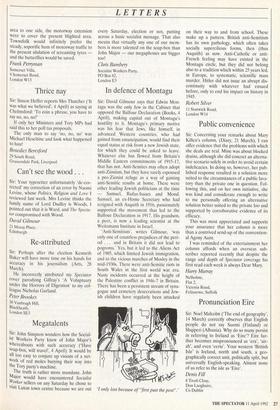In defence of Montagu
Sir: David Gilmour says that Edwin Mon- tagu was the only Jew in the Cabinet that opposed the Balfour Declaration (Books, 4 April), making capital out of Montagu's hostility to it. Montagu's primary motive was his fear that Jews, like himself, in advanced Western countries, who had gained from emancipation, would find their equal status at risk from a new Jewish state, for which they could be asked to leave. Whatever else has flowed from Britain's Middle Eastern commitments of 1915-17, that has not. Anti-Semites may often adopt anti-Zionism, but they have rarely espoused a pro-Zionist refuge as a way of gaining anti-Semitic results at home. There were other leading Jewish politicians at the time — Samuel, Rufus-Isaacs and Mond. Samuel, an ex-Home Secretary who had resigned with Asquith in 1916, passionately supported the movement that led to the Balfour Declaration in 1917. His grandson, a peer, is now a leading scientist at the Weitzmann Institute in Israel.
'Anti-Semitism', writes Gilmour, 'was only one of countless prejudices of the peri- od . . . and in Britain it did not lead to pogroms.' Yes, but it led to the Aliens Act of 1905, which limited Jewish immigration, and to the vicious marches of Mosley in the mid-1930s. There were anti-Semitic riots in South Wales in the first world war era. Nasty incidents occurred at the height of the Palestine conflict in 1946-7 in Britain. There has been a persistent stream of syna- gogue and cemetery desecrations and Jew- ish children have regularly been attacked
'I only lost because of "first past the post".'
on their way to and from school. These make up a pattern. British anti-Semitism has its own pathology, which often takes socially supercilious forms, then (thus Asquith) as now. Anti-Catholic or anti- French feeling may have existed in the Montagu circle, but they did not belong also to a tradition which within 25 years led, in Europe, to systematic, scientific mass murder. Hitler did not issue an abrupt dis- continuity with whatever had ensued before, only to end his impact on history in 1945.
Robert Silver lt Stanwick Road, London W14


















































 Previous page
Previous page